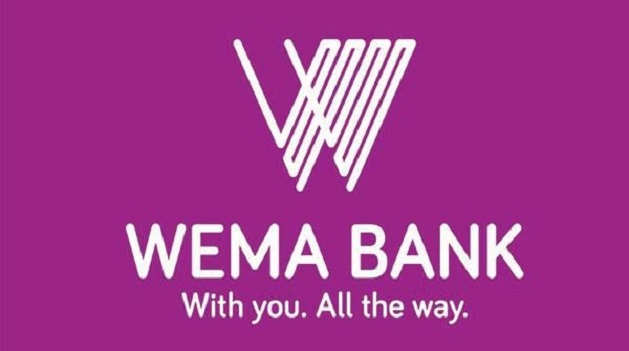E-Financial
Wema Bank Commences N39.95bn Rights Issue

Wema Bank Plc has commenced its rights issue to raise about N39.95 billion from its existing shareholders. According to information released to the media, subscription for the rights issue commenced on Monday, December 11, 2023, and will conclude on Friday, December 29, 2023.

The financial institution is offering a total of 8,572,103,573 ordinary shares of 50kobo each at N4.66 per share on the basis of two shares for every three shares held as at September 28, 2023. This amounts to N39.95 billion rights issue.
The stock price of Wema bank closed yesterday at N5.19 per share, meaning that a shareholder who partake in the exercise is getting it at a discount of N0.53 per share.
The stock price of Wema bank opened for trading this year at N3.90 per share and it has gained N1.29 per share or 33.1per cent Year-till-Date (YtD) growth.
Interested shareholders would be able to partake in the rights issue by taking up two new ordinary shares for every three ordinary shares held as of the close of business on September 28, 2023.
The shares to be taken up by qualifying investors will rank pari-pasu in all respects with the issued ordinary shares of Wema Bank.
The lead issuing house for the transaction is Greenwich Merchant Bank, while the joint issuing house if Qualinvest Capital Limited.
Mr. Tunde Mabawonku, the Executive Director, Retail and Digital Business, who was the Chief finance officer of the bank had said the bank would utilise the raised capital to drive growth phase for the bank and accelerate improvements in the share price, deepen value creation, increase credit creation, increase digital play with technology acquisition and increase geographic expansion.
“Others include deploy one stop digital platform to strengthen digital play for the bank, increased customer acquisition and retention in the youth, SME and financial excluded segments and include valuation of financial services business because of improved size,” Mabawonku said.
The lender is expected to utilized 67.94 per cent of the funds from the exercise to deepen its retail and commercial loan portfolio for 13 months, 21.88 per cent to be used by the bank to increase its lending capacity to the SME sector for 15 months, 8.21 per cent would be earmarked to improve IT infrastructure to strengthen the company’s digital play (ALAT) for 10 months, while 1.97 per cent would be used for the rights issue as processing fees.
Amid domestic and external macroeconomy challenges, Wema Bank continued to sustained its growth trajectory in 2023 unaudited result & accounts and it is expected to surpassed analysts, and shareholders expectation in the year under view.
The Nigeria’s first digital bank has continued its growth trajectory and momentum across all key performance indicators and it is poised to shareholders return and stock price appreciation.
Wema Bank hits all-time high in profit before tax and profit in third quarter (Q3) ended September 30, 2023, driven by 59.08 per cent increase in gross earnings, and 168.53 per cent growth in other income.
Targeting N22.5billion profit before tax in 2023 financial year (FY), Wema Bank reported N22.15billion in Q3 2023, an increase of 133.86per cent from N9.46 billion reported in Q3 2022.
The financial institution in 2022FY performance declared N14.88billion profit before tax from N12.28billion in 2021FY. In 2020FY, it reported N5.93billion profit before tax from N6.76billion in 2019FY and N4.8billion profit before tax in 2018FY.
Profit after tax also increased significantly in Q3 2023 to N18.88 billion from N8.19billion in Q3 20222, another milestone achievement for the current management of Wema Bank.
In 2022FY, Wema Bank declared N11.35billion profit, representing an increase of about 27.17per cent from N8.93billion reported in 2021FY.
With the growth in profit, the group’s Return on Average Equity increased to 29.32 per cent in Q3 2023, highest so far in the history of the lender. The 2023FY guidance is 20 per cent.
However, the impressive performance in the period back by N151.69billion gross earnings in Q3 2023, an increase of 59.08 per cent from N95.35billion in Q3 2022.
E-Financial
EFCC Seeks Suspension, Prosecution of Banks for Aiding N162Bn Crypto Scams

Economic and Financial Crimes Commission (EFCC) has called for the suspension and prosecution of deposit banks, Fintechs and microfinance banks aiding and abetting fraudsters in defrauding Nigerians through fraudulent schemes.

Wilson Uwujaren, director of Public Affairs of the Commission, made the call in Abuja, on the sidelines of a recent news briefing about negligence and compromise of the financial institutions that cost victims billions of naira.
Uwujaren said that the commission uncovered widespread compromise within Nigeria’s financial system, involving an N18.7 billion investment scam and fraudulent transactions of N162 billion in cryptocurrencies.
He accused one new-generation bank, six Fintechs and some microfinance banks of aiding and abetting fraudsters in laundering their proceeds.
“It is worrisome that investigations by the commission showed that cryptocurrency transactions to the tune of N162 billion passed through a new generation bank without any due diligence.
“Investigations also showed that a single customer maintained 960 accounts in the new generation bank, and all the accounts were used for fraudulent purposes.”
He said that the financial institutions clearly compromised banking procedures and allowed the fraudsters to safely change their ill-gotten gains into digital assets and move them to safe destinations.
“The Commission is calling on regulatory bodies to bring financial institutions to compulsory compliance with regulations in the areas of Know Your Customers (KYC), Customer Due Diligence (CDD), Suspicious Transaction Reports (STRs) and others.
“Deposit money banks, Fintechs and microfinance banks found to be aiding and abetting fraudsters should be suspended and referred to the EFCC for thorough investigation and possible prosecution,” he said.
He said that the scams of N18.7 billion were in two categories, adding that the first was a syndicate of fraudsters that employed an airline discount scheme to lure their victims.
The second one, according to him, involved a company named Fred and Farid Investment Limited, simply called FF Investment, which lured Nigerians into a bogus investment arrangement.
“The modality of the fraudsters in the airline scam involved a string of carefully devised airline discount information that any unsuspecting foreign traveller will fall for.
“What they do is to advertise a discount system in the purchase of flight tickets of a particular foreign carrier.
“The payment module is designed in such a way that their victims would be convinced that the payment is actually made into the account of the airline.
“No sooner is the payment made than the passenger’s entire funds in his bank account are emptied.”
He said that over 700 victims had fallen into the trap of fraudsters through the scheme with a total loss of N651.1 million.
Uwujaren said that the commission succeeded in recovering and returning N33.63 million to victims of the scam and cautioned Nigerians to be more vigilant.
The second scheme, according to him, involved a company named Fred and Farid Investment Limited, simply called FF Investment, which lured Nigerians into bogus investment arrangements.
“More than 200,000 victims have been defrauded in this regard. A total sum of N18.1 billion was raked in through nine companies offering diverse investment packages.”
Uwujaren said that foreign nationals are behind the schemes, with three Nigerian accomplices who have been arrested and charged in court.
E-Financial
Fitch Downgrades Afreximbank to ‘BB+’/Stable Amid Concerns Over Ghana’s Debt

Fitch Ratings has downgraded African Export-Import Bank’s (Afreximbank) Long-Term Issuer Default Rating (IDR) to ‘BB+’ from ‘BBB-’.

Fitch also downgraded Afreximbank’s Short-Term IDR to ‘B’, from ‘F3’, and the long-term ratings on the bank’s global medium-term note programme and debt issuance to ‘BB+’, from ‘BBB-’.
The global rating institution subsequently withdrew the bank’s ratings.
In a statement posted on its website, Fitch explained that the downgrade “reflects our revision of Afreximbank’s policy importance risk to ‘medium’ from ‘low’ following the announcement of an agreement on Ghana’s debt to Afreximbank in the context of Ghana’s broader restructuring”.
It said, “This has led us to revise our assessment of Afreximbank’s business profile to ‘high risk’ from ‘medium risk’, which resulted in an overall business environment notching of -3 (-2 previously).”
Essentially, a BB+ /Stable rating from Fitch is considered non-investment grade, also known as high-yield or “junk”.
The statement added, “Fitch has chosen to withdraw the ratings for commercial reasons. Fitch will no longer provide ratings or analytical coverage for the bank.”
In arriving at its decision, Fitch stated, “Afreximbank and Ghana announced in December 2025 that they had reached an agreement in principle with respect to Afreximbank’s $750 million sovereign loan to Ghana.
“The IMF stated that the deal is in line with the comparability of treatment under Ghana’s official creditor committee. We view this as evidence that Afreximbank did not benefit from its preferred creditor status (PCS).”
It said, “While we had not previously given any uplift in our solvency assessment for PCS, the de-facto preferential treatment in a broader sense that Afreximbank, along with most other multilateral development banks, benefit from was previously factored into our assessment of the bank’s policy importance.
“The bank’s inclusion in Ghana’s restructuring underlines its weakening policy importance, in our view.”
The rating institution also said, “Our latest assessment of Afreximbank’s ‘high’ business profile risk underpins the ‘high risk’ quality of governance assessment, and ‘high’ strategy risk.
“The ‘high risk’ business environment assessment reflects the bank’s exposure to a ‘high risk’ operating environment with weak credit quality, low income per capita and high political risk in the countries of operation.”
It explained that the ratings were driven by the bank’s Standalone Credit Profile (SCP) of ‘bb+’, reflecting the lower of the solvency (bbb+) and liquidity (a) assessments and its ‘high risk’ business environment.
The statement added that the solvency assessment balanced the bank’s ‘strong’ capitalisation and ‘moderate’ risk profile.
Fitch stated, “Afreximbank’s ‘bbb+’ solvency assessment reflects both ‘strong’ capitalisation and ‘moderate’ solvency risks. Our assessment of capitalisation is underpinned by a ‘moderate’ usable capital to risk-weighted assets (21 per cent at end-2024) ratio, a ‘strong’ equity to assets and guarantees ratio (19 per cent) and ‘excellent’ internal capital generation.
“The ‘moderate’ solvency risks assessment reflects ‘high’ credit risk, ‘weak’ risk management policies, ‘low’ concentration risk and ‘very low’ equity risk.
“Afreximbank’s ‘a’ liquidity assessment reflects the ‘strong’ quality of treasury assets, measured by the share of treasury assets rated ‘AA-’ to ‘AAA’ (50 per cent at end-2024 and we expect it to remain above the ‘strong’ threshold of 40 per cent), and a ‘moderate’ liquidity buffer (defined as liquid assets-to-short-term debt, at 95 per cent at end-2024).
“The bank’s liquidity profile is enhanced by its access to capital markets and diversified funding sources, including credit lines ($2.1 billion, of which $0.6 billion was committed at end-2024) and collateral deposits. The short duration of the loan portfolio also contains liquidity needs.”
Fitch also stated that it “assesses shareholders’ capacity to support Afreximbank at ‘bb-’, based on the average rating of key shareholders (ARKS) accounting for more than 50 per cent of the bank’s capital.
“The sovereign upgrades of Egypt and Nigeria, Afreximbank’s two largest shareholders, in April 2025 improved the ARKS to ‘B+’ from ‘B’.
“Credit risk mitigants on callable capital (covering 40 per cent of $4.3 billion) enhance the support capacity by one notch to ‘bb-’.
“The support assessment also reflects the ‘strong’ propensity of shareholders to support the bank, which has been consistently demonstrated by ongoing capital injections and dividend reinvestments.”
E-Financial
FBNQuest Merchant Bank Rebrands as Quest Merchant Bank

FBNQuest Merchant Bank Limited has completed a change of name and will now operate as Quest Merchant Bank Limited, following the receipt of all required corporate and regulatory approvals.

The name change does not affect the Bank’s legal or going-concern status, management, or the nature of its business. Quest Merchant Bank Limited remains a duly licensed merchant bank, regulated by the Central Bank of Nigeria (CBN) and the Securities and Exchange Commission (SEC), and continues to deliver its full suite of merchant banking, advisory, and capital markets services to clients.
Commenting on the development, the Ag. Managing Director/CEO, Afolabi Olorode, stated: “This name change represents a pivotal milestone in the rich history of the Bank and a deliberate strategic repositioning that reflects our resilience, strong track record, and long-term growth ambitions. While our name has evolved, our commitment to our clients, stakeholders, and regulators remains unwavering.”
As part of the transition, the Bank is updating its branding, communications, and digital platforms to reflect the new name. During this period, some legacy references may remain visible across select touchpoints as updates are progressively completed.
All existing contracts, client relationships, and obligations of the Bank remain valid, binding, and fully enforceable following the name change.

 News2 days ago
News2 days agoStanley Amandi, Nollywood Actor Arrested over Alleged Coup Plot against Tinubu

 E-Business2 days ago
E-Business2 days agoKaspersky Launches OT Calculator to Align Cybersecurity Investments with Business Goals

 E-Financial2 days ago
E-Financial2 days agoFBNQuest Merchant Bank Rebrands as Quest Merchant Bank

 General News1 day ago
General News1 day agoNigeria’s Data Privacy Economy Hits ₦16.2bn – NDPC Commissioner

 Telecom2 days ago
Telecom2 days agoFG to Acquire Two Communications Satellite to Boost Digital Access

 General News2 days ago
General News2 days agoHow Plot to Topple Tinubu was Uncovered, Foiled

 Telecom1 day ago
Telecom1 day agoAfrica’s AI Guru Abodunrin Charts Path to Continent’s Digital Dominance

 General News2 days ago
General News2 days agoMoniepoint Marks 10 Years of Transforming Nigerian Businesses


























